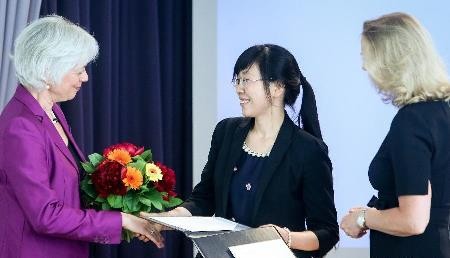Zhu Xiaoxiang, a young Chinese researcher, was bestowed the prestigious Heinz Maier-Leibnitz Prize, an important prize for early career researchers in Germany, the Xinhua News Agency reported.
According to the report, Zhu, besides nine other researchers, received the award at a ceremony in Berlin on April 5, Tuesday.
Since 1977, the German Research Foundation (DFG) has been giving the Heinz Maier-Leibnitz Prize annually to outstanding early career researchers to recognize their work and encourage them to further pursue the path of academic and scientific excellence.
The prize is regarded as the third most valuable science prize in Germany, which is named after the atomic physicist and former DFG president.
Next to the Heinz Maier-Leibnitz Prize, the second most important is the Gottfried Wilhelm Leibnitz Prize, also awarded by the DFG, and the most valuable by the German Future Prize, which is awarded by the German Federal President.
Xinhua said that Zhu, 30 years old, is an honorary professor at the Technical University of Munich, who was honored for her research concerning Earth observation. The DFG said that the professor plans to make improvements on remote sensing data and provide the foundations for the design of new satellite sensors.
The report said that Zhu is a group leader at the German Aerospace Center, where she works to develop modern signal processing methods, reconstruct poor signal strengths to improve resolution, and minimize noise using non-local filters or reconstructing objects using robust estimators.
"It's a golden era for Earth observation," Zhu told Xinhua. "Europe has many relevant projects and China is also making great progress. I'd like to make contributions to promoting scientific cooperations between Germany and China in this area."



























